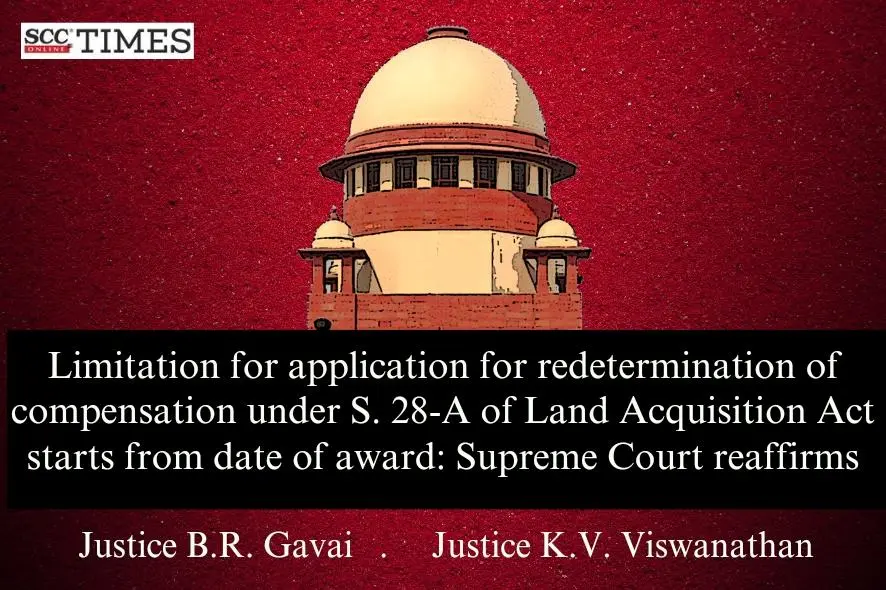Supreme Court: In an appeal filed against the judgment and order passed by the Punjab & Haryana High Court, wherein the writ petition filed by Haryana State Industrial and Infrastructure Development Corporation Limited (HSIIDC) under Articles 226 and 227 of the Constitution of India praying for quashing the order passed by the District Revenue Officer- cum-Land Acquisition Collector (‘LAC’), came to be allowed, the division of B.R. Gavai* and KV Viswanathan, JJ. while setting aside the impugned judgment, upheld the LAC order and reaffirmed that the limitation for moving the application under Section 28-A of the 1894 Act will begin to run only from the date of the award based on which redetermination of the compensation is sought. The appellants are seeking redetermination of the compensation based on the judgment and order of the High Court in First Appeal within a period of three months from 2-05-2016.
Background
By a notification dated 17-11-2004 under Section 4 of the Land Acquisition Act, 1894 (‘1894 Act’), the land of the appellants was acquired for the Kundli-Manesar-Palwal Expressway project. Following this, an award dated 1-03-2006 was issued, determining the compensation for the acquired land at Rs. 12,50,000/- per acre. Aggrieved by the award, the landowners in similar circumstances, including the appellants, filed a reference for enhancement of compensation under Section 18 of the Land Acquisition Act, 1894 before the Additional District Judge. However, by an order dated 17-01-2012, the reference was dismissed, leaving the appellants dissatisfied with the compensation determined in the original award.
The landowners, including the appellants, preferred a First Appeal before the High Court, challenging the initial compensation determination, wherein the High Court allowed the appeal, enhancing the compensation to Rs. 19,91,300/- per acre, along with statutory benefits.
Subsequently, the appellants filed an application under Section 28-A of the 1894 Act before the LAC, as they had not filed a reference earlier. On 15-09-2020, the LAC ruled in favor of the appellants, granting them the same enhanced compensation of Rs. 19,91,300/- per acre, in line with the High Court’s decision for similarly circumstanced landowners.
However, HSIIDC filed a writ petition before the High Court, challenging the LAC’s order. The High Court, in its impugned judgment and order, allowed the writ petition, and set aside the LAC’s order, referencing the Supreme Court’s judgment in Ramsingbhai Jerambhai v. State of Gujarat, (2018) 16 SCC 445, wherein it was held that applications under Section 28-A of the 1894 Act must be filed within three months from the Reference Court’s judgment under Section 18 of the 1894 Act, not from the date of the High Court or Supreme Court judgment.
Aggrieved by this decision, the appellants have now approached the Supreme Court for redress.
Analysis and Decision:
After taking note of Ramsingbhai (supra), said that this Court has not noticed an earlier judgment rendered by this Court in Union of India v Pradeep Kumari, (1995) 2 SCC 736, wherein it was held that the object underlying the enactment of Section 28-A of the 1894 Act is to remove inequality in the payment of compensation for same or similar quality of land arising on account of inarticulate and poor people not being able to take advantage of the right of reference to the civil court under Section 18 of the 1894 Act. It was held that this is sought to be achieved by providing an opportunity to all aggrieved parties whose land is covered by the same notification to seek redetermination once any of them has obtained orders for payment of higher compensation from the Reference Court under Section 18 of the 1894 Act. It was held that while construing the provisions of such a legislation, the Court should adopt a construction which advances the policy of the legislation to extend the benefit rather than a construction which has the effect of curtailing the benefit conferred by it.
Thus, the Court said that the limitation for moving the application under Section 28-A of the 1894 Act will begin to run only from the date of the award based on which redetermination of the compensation is sought. The appellants are seeking redetermination of the compensation based on the judgment and order of the High Court in First Appeal within a period of three months from 2-05-2016.
The Court viewed that the case of the appellants was fully covered by the judgment of this Court in the case of Pradeep Kumari (supra).
The Court mentioned that the judgment rendered in Ramsingbhai (supra), does not take note of the earlier view taken by three judges of this Court in the case of Pradeep Kumari (supra).
The Court reiterated that an earlier decision of a Bench of particular strength would be binding on the subsequent Benches of this Court having the same or lesser number of judges. Further, a decision or judgment can be said to be per incuriam if it is not possible to reconcile its ratio with that of a previously pronounced judgment of a co-equal or larger Bench.1
The Court highlighted that the judgment in Pradeep Kumari (supra) has been rendered by three Judges of this Court after considering the relevant provisions of the Statute and the principles of interpretation. However, the judgment in the case of Ramsingbhai (supra) is a short judgment only referring to the text of Section 28-A(1) of 1894 Act.
Therefore, the Court set aside the impugned judgment and order and upheld the LAC order.
CASE DETAILS
|
Citation: Appellants : Respondents : |
Advocates who appeared in this case For Petitioner(s): For Respondent(s): |
CORAM :
Buy Constitution of India HERE
1. National Insurance Company Limited v. Pranay Sethi, (2017) 16 SCC 680










I ask to all kya banjar land ki will valid hai ya nahi